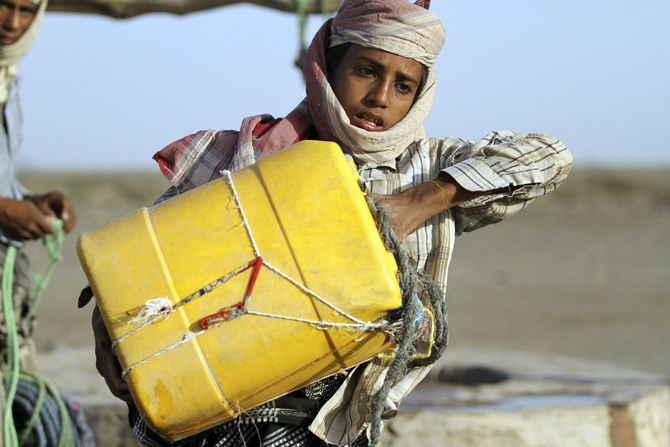
Sadly, it takes a tragedy of the magnitude of the manslaughter of 39 stowaway women and men in a refrigerated container on the back of a lorry — as was the case in Essex in eastern England late last month — to highlight one of the most appalling criminal activities of our time: Human trafficking. This grim discovery of these victims, who appear to be Vietnamese people in search of a better life, opened a window on this sinister trade in human beings, which continues daily and almost in broad daylight.
The cynical exploitation of the misery of those who are escaping war, famine or oppression by unscrupulous and greedy smugglers, who take the last pennies from their victims, deceive them with false promises and put their lives at risk, was exposed in its full ugliness. Regrettably, it is only when these schemes go catastrophically wrong and end with the death of those who are trafficked that our publics and governments pay attention to a phenomenon that is a stain on us all. But even public outcries quickly die down, while the illegal trade in human beings continues unchecked.
The UN Office on Drugs and Crime defines human trafficking as “the recruitment, transport, transfer, harboring or receipt of a person by such means as threat or use of force or other forms of coercion, abduction, fraud or deception for the purpose of exploitation.” According to the International Labor Organization (ILO), there are an estimated 40.3 million people in modern slavery, including 24.9 million in forced labor and 15.4 million in forced marriages. This translates to 5.4 victims of modern slavery for every 1,000 people who live on this planet. A quarter of the victims of modern slavery are children, and the vast majority of them — more than 70 percent — are female. The dire situation of trafficked women is not only because they are disproportionately affected by forced labor, but also because they account for 99 percent of victims in the commercial sex industry, facing daily humiliation, violence, rape, and sometimes death.
Human trafficking is enormously profitable for those who are involved in it, and it is estimated that it earns about $150 billion a year for traffickers globally, $99 billion of which comes from commercial sexual exploitation. Considering the amount of money involved and the sad state of the human condition, it is not surprising there are enough heartless criminals out there ready to smash any moral codes, while also taking big risks in getting involved in this sinister activity.
Right now, the initiative, the resources and the financial incentives are with the traffickers.
Yossi Mekelberg
These rings of global criminals are encouraged by their knowledge of the relatively small budgets allocated by governments to combat human trafficking. Only a few months ago, the US Secretary of Labor at the time, Alexander Acosta, proposed an 80 percent budget cut for the Bureau of International Labor Affairs, an agency that works to combat human trafficking. In the UK, while the impact of modern slavery is estimated at more than $4 billion, the budget for tackling it is £61 million ($78 million), which, according to all experts, is a drop in the ocean compared to the magnitude of the problem. In many countries across the world, law enforcement agencies are either doing very little to stop human trafficking, are not interested enough to prevent it or, even worse, are actively involved in facilitating it by being in cahoots with the traffickers.
Whatever terms we use — human trafficking, trafficking of persons, or modern slavery — the phenomenon represents our failure as a global society to protect the lives and well-being of those who fall into the hands of traffickers and end up in forced labor, forced marriage, prostitution, and even suffer organ removal. We treat those who are trafficked as invisible, though we know exactly who they are, in what ways they are trafficked, who employs them, and why those known to be exploiting them are doing so in the most inhuman ways. Worse, we sometimes blame the victims for their predicament, adding insult to injury.
Instead of fulfilling their dream of a new life and being able to send money back home to support their poor families, the vast majority of those who are trafficked are locked in houses for most of the time, their passports and phones are confiscated, and their wages are too meager to support themselves, let alone their families. If they dare to protest against their inhuman terms of “employment,” they face threats of deportation and violence from their employers and traffickers.
A breakthrough in the employment conditions of domestic workers took place in 2011, when the ILO introduced the domestic workers’ convention, which should have enshrined their rights in international law. But too many countries, including those in the West, haven’t ratified the convention or have opted out of crucial clauses and, by that, have weakened the battle to combat trafficking and protect the rights of domestic workers. By opting to not ratify, let alone sign the convention, these governments are aiding and abetting trafficking.
If societies are serious about eradicating people trafficking, they should cooperate closely and globally by, among other things, incorporating into national legislation those international conventions prohibiting trafficking and slavery. Moreover, combating trafficking must become a top agenda priority and be given adequate resources. Right now, the initiative, the resources and the financial incentives are with the traffickers. Until the chains of demand and supply are cut, the temptation for those who are involved in trading human beings — whether they are the smugglers or those who then unscrupulously exploit their desperate victims — is too great.
There can be no comfort for the families of those who recently met such a cruel death, freezing and suffocating in the back of a lorry. If those responsible for this needless loss of life were to face the full force of the law, it might give the families some consolation. Nevertheless, any punishment of the perpetrators will remain a hollow victory unless governments and international law enforcement agencies begin to do all they possibly can to prevent any would-be migrants or refugees from becoming the next victims of modern slavery.
Yossi Mekelberg is professor of international relations at Regent’s University London, where he is head of the International Relations and Social Sciences Program. He is also an associate fellow of the MENA Program at Chatham House. He is a regular contributor to the international written and electronic media. Twitter: @YMekelberg












